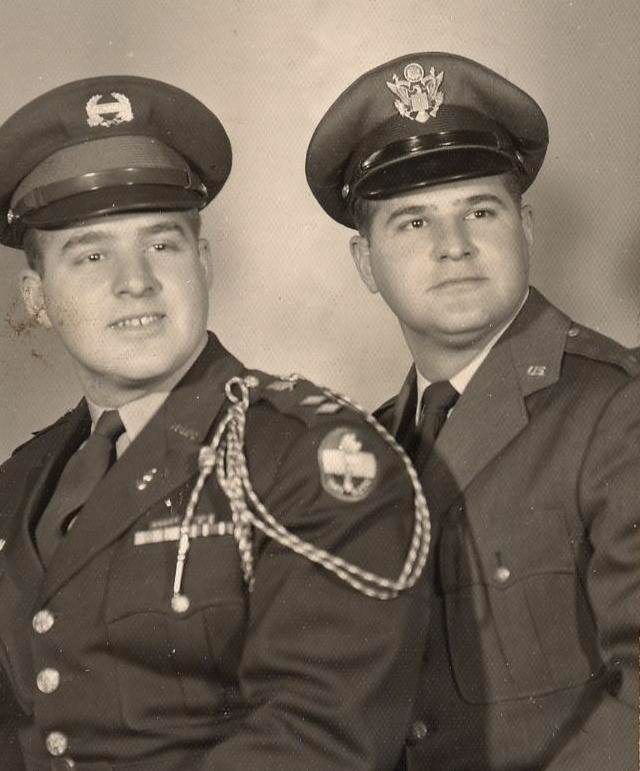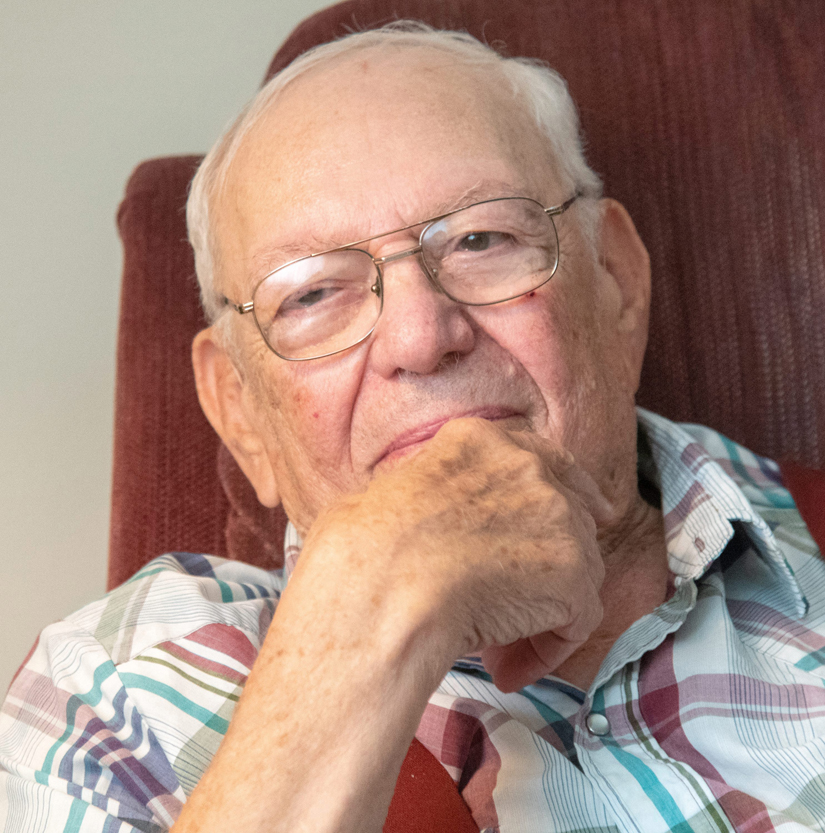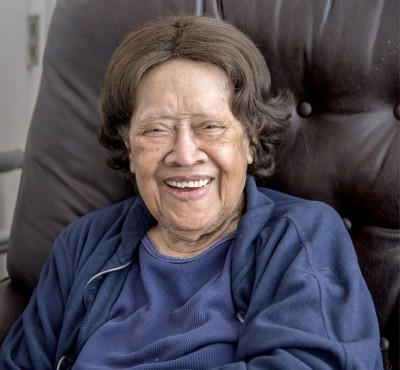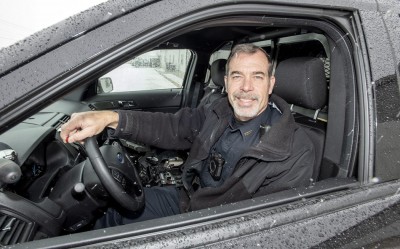The Ellenberger-Brown family
By Paul Wood

Photo By Provided
Southwest of Champaign, Richard and Sheryl Brown Elllenberger live a life that has included being officers — she a captain, he a major, both alumni of the University of Illinois ROTC where they met.
Sheryl is the granddaughter of Champaign police Officer Gilbert Brown, who helped stop the biggest armed robbery of Champaign’s 20th century.
Brown’s sons achieved the ranks of brigadier general and colonel.
Bank robbery interrupted
Gilbert Brown was a hero in perhaps the biggest crime story in Champaign’s 20th century.
A 1949 story recalled the 1929 armed robbery at the Henry Harris mansion, 809 W. Church St. (It was later Cole Hospital and later still became part of the Pavilion.)
The headlines of the day: “40 Party Guests Robbed; Capture 2 of 4 Bandits; Davis Shot; Loss is Heavy.”
The Davis in question was Clyde Davis, then a patrolman, and later chief of police.
Patrolman Brown, later a top officer, was a hero of the robbery.
The Harris mansion robbery took place Nov. 9, 1929, after an Army-Illinois football game.
An armed man stuck a gun in the ribs of a doorman and the robbers proceeded to demand jewelry and cash from the wealthy partiers.
“Of course, then, we worked 12-hour shifts,” Davis recalled. “Brownie and I had worked all day, with only four hours of sleep the night before.”
Brown and Davis, cruising in their Ford patrol car, saw a red signal flash at the City Building that told them a crime was in progress.
“Brown had grabbed one of the intruders, then rushed up to aid Davis after the latter was shot by C.W. Katchman of Mattoon. Then Brown fired at and seriously wounded Katchman as Katchman and Davis came rolling down the stairs in a wrestling grip,” the story said.
Brown died in 1959.
The mansion was demolished in 2012.
The Preservation and Conservation Association has a portion of paneling from a staircase of the home that still has a bullet dent in it, said PACA’s Tom Garza.
The brothers Brown
The hero officer has two sons with extraordinary service.
Rising in rank from private to brigadier general, Champaign’s Stanford E. Brown flew jets in Vietnam, was a test pilot and headed up the Defense Nuclear Agency and an Air Force base.
His late brother George was a colonel and flew helicopters in the Army.
George’s daughter Sheryl Ellenberger rose to become a captain.
Retired in 1983, Stan Brown now lives in California.
Stan and George grew up on North Market Street.
“We were right on the city line,” Stan Brown remembered. “We grew up together with Bob Richards.”
Pole-vaulter Richards made three Olympic teams in two events. He competed in the 1948, 1952 and 1956 Summer Olympics as a pole vaulter, and also as a decathlete in 1956.
While brother George entered the military through the ROTC and immediately became an officer, “I was a dumbass; I enlisted and rose through ranks,” Stan said. “I wanted to go into World War II, but my parents wouldn’t sign the release.”
“Everybody except 4-Fs were” in the war, he said, referring to those who were deemed physically unfit to serve. “There were little flags in the window … you’d see the stars turn gold (as soldiers died). One minute the guys were playing in the streets, and the next they were gone.”
George graduated from Champaign High School in 1950.
He attended the University of Illinois on a football scholarship but was injured his freshman year. He joined ROTC and became the commandant of over 2,000 Pershing Rifles members.
He met his future wife at the Urbana campus. Upon graduation, he was commissioned as a second lieutenant in the Army.
He had a 30-year active-duty career in the armed services, serving two tours in the Vietnam War with combat missions.
His medals include two Legions of Merit and three Bronze Stars.
Just before the Korean War, Stan Brown entered as a private in the Air Force. He received a direct commission as a second lieutenant in 1953.
He was in the first all-jet class with the Lockheed T-33 Shooting Star jet trainer, introduced in 1948.
“It was a kick in the butt. I liked that jet,” he said.
Brown served as an instructor pilot, and also spent time at Chanute Air Force Base in Rantoul as a maintenance officer. He was also a maintenance test pilot.
In the Vietnam War, the brothers would meet up again.
Stan arrived just before the January 1968 Tet Offensive, a series of surprise attacks by the Viet Cong and North Vietnamese People’s Army of Vietnam throughout South Vietnam.
“I was in downtown Saigon; there were six of us with no weapons,” he said, except for his .38 revolver, which was a present given to his father after the latter broke up the Harris Mansion robbery.
“My brother George was in a helicopter, and he called to ask how I was doing. I said ‘up to (my posterior) in alligators. Look for me in two hours; I’ll be up on our roof,'” he said.
With snipers in water towers shooting at them and helicopters strafing them, Stan Brown and his men finally escaped. George dropped weapons to the U.S. men.
The general flew about 900 combat hours in Vietnam as part of his total 6,000-plus flying hours in Air Force aircraft.
He later spent 10 years with the Northrop Corporation, now Northrop Grumman.
He now lives in Riverside, Calif., where he commanded March Air Force Base for more than four years. He has eight grandchildren.
George and his wife, Marlyn, retired in Chandler, Ariz. They too, had eight grandchildren.
The Ellenbergers
Sheryl Ellenberger, the daughter of the late Col. George Brown, didn’t expect to serve in the military herself.
It was the Vietnam war and she had other plans, like millions of young Americans.
“I was the kid that hated the military, hated travel. We’d moved 19 times by the time I was 18,” she said.
Having lived most of her young life on bases throughout the United States, she ultimately graduated from high school in Belgium. She wanted to go back to the United States and attend cosmetology school.
She ended up at the UI because at the time, her father and family were still in Europe, and they wanted her to be close to family. By attending the Urbana campus, she would be surrounded by family.
During her freshman year she joined the Gamma Phi Beta sorority and despite not planning to, in her junior year took a military-science class, where she was one of four women.
“I felt like I found home,” she said.
While cleaning weapons after an ROTC field-training exercise, she connected with future husband Richard, a Joliet native.
He thinks it’s a romantic story that she had a problem putting her weapon back together and he helped her; she finds the anecdote a little embarrassing.
She would spend nearly five years in the active Army and an additional three years in the reserves. She was a quartermaster corps officer, reaching the rank of captain, while he would have a full career, first as a medic, then as a helicopter commander before retiring as a major as a health care administrator.
The family is pretty service-oriented, she said.
“My younger sister has a son who is a captain in the Army and my brother has a daughter who is a captain that recently graduated from Duke Medical School,” she said. “Most of us went though ROTC at the UI. An exception was a brother who went to West Point.”
Her husband, also retired from the military, has had a long and varied career.
Richard Ellenberger started out as a medic, then learned to fly helicopters.
A pilot in medevac said, “If you want to do this, I can help you.”
He went to flight school, then flew to “pick up organs, eyeballs late at night, I flew a few complex pregnancies.”
He had a one-year deployment to Dhahran, Saudi Arabia, for Operation Desert Storm in 1990 where he commanded a fleet of 15 Black Hawk helicopters that flew 2,400 accident-free flight hours.
In 1991 at an Army barracks in Khobar City, near Dhahran, 28 were killed and 89 wounded in a Scud missile attack, the last of the war.
It was the most disastrous attack on allied forces in Operation Desert Storm. Eighty-one percent of the Pennsylvania unit’s 69 soldiers had been killed or wounded.
“Every night, Saddam would throw three or four Scud missiles,” Richard Ellenberger recalled. “We had Patriot missile batteries. For some reason, a Patriot missile hit the Scud rocket motor but didn’t get the warhead taken out.”
With blast injuries, ruptured eardrums, traumatic amputations and blast burns, the injured called for medevac.
“I launched in an aircraft, got another crew, and probably four aircraft flew back and forth about 30 sorties with the injured,” he said. “You take the seriously wounded first. You leave the broken arms, the shocked. I think we saved 30-some people, but many, many died.”
Since chemical warfare was always a possibility, medevac crew wore protective masks plugged into their helmets.
“They put me in for a Bronze Star for valor; I’m just up high playing traffic controller,” he said.
His final assignment was at Fort Carson, Colo. He retired in 1996.
The next year, the Ellenbergers relocated to Champaign, where he joined Sarah Bush Lincoln Health System in Coles County as a clinic director.
The Ellenbergers continue to work in the community; she at the UI Fire Service Institute and he as a substitute teacher for the Unit 4 school district. Their son Brian, a graduate of Parkland College and EIU, lives in Champaign.
George’s other three children
Rebecca (Brown) Groves and husband John of Chandler, Ariz.: both are UI graduates. She is a special-needs teacher and had a four-year ROTC scholarship while attending the UI. John is a successful real-estate agent.
Clayton Brown and wife Desiree (Rigabar) of Alexandria, Va.: He is a retired Army lieutenant colonel and a West Point graduate with a three master’s degrees. She was an elementary school teacher and now works as a nurse at the VA Hospital in Arlington, Va.
Kimberly (Brown) Burch and husband Todd of Hoopeston: She is a graduate of the UI and its ROTC program. She was a captain in the Army. After the military, she became a teacher for 18 years. She is a vice principal at Danville High School.
Todd Eric Burch is a UI graduate and has two master’s degrees. He teaches history in Danville; his first nine years in the military were active duty. After a stint in the reserves, he returned to active duty. Time abroad was in Germany and Desert Storm, where he served as a military-intelligence liaison. He saw oil fields on fire, and his own troops firing on friendly tanks. The lieutenant colonel also served in Iraq and Afghanistan.
The Ellenberger-Brown family by the numbers:
4 generations of the family
14 University of Illinois degrees
10 military officers
1 hero cop
6 service personnel commissioned from Army ROTC out of the University of Illinois
5 military aviators
Read more stories from local veterans:
 Howard Ross
URBANA — Howard Ross earned the Purple Heart when Japanese troops zeroed in on his position in the last few months of Wo …
Howard Ross
URBANA — Howard Ross earned the Purple Heart when Japanese troops zeroed in on his position in the last few months of Wo …
 Anna Wall Scott
CHAMPAIGN — Former American Legion Post 559 Commander Anna Wall Scott — a World War II veteran and one of the first Wome …
Anna Wall Scott
CHAMPAIGN — Former American Legion Post 559 Commander Anna Wall Scott — a World War II veteran and one of the first Wome …
 Steve Bein
FISHER — As a lieutenant colonel in the National Guard and Army Reserves, Steve Bein was a battalion commander and serve …
Steve Bein
FISHER — As a lieutenant colonel in the National Guard and Army Reserves, Steve Bein was a battalion commander and serve …